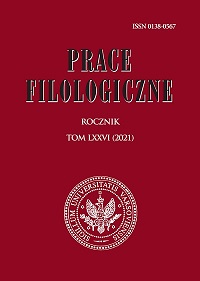Istokorenska (ne)vzporednost tvorjenk s pomenom vršilca dejanja in nosilca stanja v slovenščini
The (Non)Parallelism of Slovene Word Derivations from the Same Base with the Meaning of Agent and State Carrier
Author(s): Irena Stramljič BreznikSubject(s): Morphology, Lexis, Cognitive linguistics, South Slavic Languages
Published by: Wydział Polonistyki Uniwersytetu Warszawskiego
Keywords: Slovene language; word formation; agent; state carrier; cognitive grammar; trajector; landmark;
Summary/Abstract: The paper uses material from SSKJ 2 and the Gigafida 2.0 corpus to examine the potential of the Slovene language to derive nouns from the same base which form word-formational pairs with the meaning of agent (A) (employer) and state carrier (employee) (CofS). We can conclude that the parallelism of both types of derivation is dependent on two factors: the grammatical and semantic features of the verb. In terms of grammar, it is the verbal aspect which plays an important role, as the study shows that perfective prefixed verbs are much more productive in the formation of A/CofS. In terms of semantics, the parallel conceptualization of the meaning of A (trajector) and of CofS (landmark) as formations of different degrees derived from the same verbal base is common with verbs that are associated with communication, change, possession and the body, while verbs that are associated with thought processes are the least common in this function. It is also interesting that we have not been able to find such pairs derived from the group of verbs which denote movement. Further research of such derivational pairs could also include another grammatical category, i.e. the transitivity of the verb and thematic roles.
Journal: Prace Filologiczne
- Issue Year: 76/2021
- Issue No: 1
- Page Range: 481-498
- Page Count: 18
- Language: Slovenian

